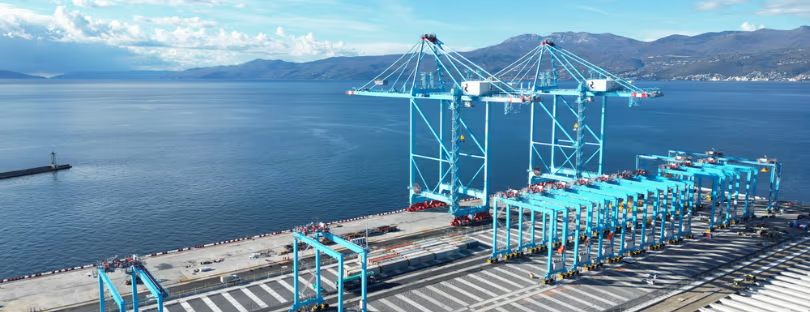
Rijeka Gateway 5G Project among Europe’s most innovative connectivity initiatives
The Rijeka Gateway 5G Campus Network Project — a bold collaboration that brought cutting-edge 5G infrastructure to Croatia’s new deep-water container terminal — has just been recognized as one of Europe’s top digital connectivity projects.
At the European Digital Connectivity Awards 2025 held in Brussels, the project ranked among the top three in the “Excellence and Innovation in Implementing Gigabit-Ready Infrastructure” category, a significant acknowledgment for both Hrvatski Telekom and Croatia’s growing digital ecosystem.
A 5G Breakthrough at the Heart of the Adriatic
The Rijeka Gateway project, powered by Hrvatski Telekom (HT), has transformed the new terminal into one of the most technologically advanced logistics hubs in the region. HT’s role was to deploy a complete 5G-managed service, a turnkey network designed specifically for the demanding maritime and logistics environment.
This setup merges public 5G infrastructure with a private, security-enhanced network slice, delivering all the advantages of a dedicated private network—high reliability, ultra-low latency, and enhanced data security—without the need for operators to manage their own 5G teams or infrastructure.
It’s not just a local milestone: this marks the first deployment of its kind within the Deutsche Telekom Group, and one of the earliest in Europe to combine hybrid 5G architecture for industrial use.
Recognition from Europe’s Connectivity Leaders
The European Digital Connectivity Awards, organized by the European Commission’s DG CONNECT, celebrate projects that make high-speed digital infrastructure a reality across Europe. This year’s awards spotlighted initiatives driving gigabit-capable networks in industries from healthcare to transport.
The top honor in Rijeka Gateway’s category went to Hola 5G Oulu from Finland—a pioneering project that implemented the first private standalone 5G network in a European hospital. Yet, Rijeka Gateway’s placement in the top three underscores how far the Western Balkans have come in terms of digital transformation and industrial 5G readiness.
Setting New Standards for the Maritime Industry
According to Marijana Bačić, Member of the Management Board and Chief Operating Officer for Business at Hrvatski Telekom, the recognition proves that Croatian innovation can stand shoulder-to-shoulder with Europe’s best:
“The fact that Rijeka Gateway has been declared strategically important for Croatia speaks volumes about its value and significance. I’m extremely proud that our project has been recognized among the best in the EU. With our 5G-based network infrastructure, we’ve helped make Rijeka Gateway the most advanced container terminal in the region—setting new standards in business-critical communication.”
Robert Manenica, Principal in business customer service development and portfolio management at HT and project lead for Rijeka Gateway, adds:
“Rijeka Gateway isn’t just a technological milestone — it’s also an organizational and business model. This project confirms Croatia’s position as a leader in industrial digital transformation and shows that we can deliver solutions that compete on the European stage.”
Why Rijeka Gateway Matters Beyond Croatia
The project’s impact extends far beyond the Adriatic. Globally, ports and logistics hubs are becoming testbeds for industrial 5G, offering a glimpse of how ultra-fast, low-latency connectivity can streamline operations, improve safety, and automate complex processes.
Across Europe, similar 5G-driven transformations are happening at ports in Hamburg, Antwerp, and Rotterdam, where telecom operators and infrastructure providers are experimenting with smart cranes, remote-controlled vehicles, and IoT-based asset tracking. Rijeka’s entry into this elite group signals a major leap forward for Southeastern Europe.
However, challenges remain. While 5G deployments in logistics are gaining traction, integration costs, spectrum management, and cybersecurity continue to be barriers for many regions. According to the European 5G Observatory, only around 45% of European industrial zones have access to reliable 5G standalone coverage, a gap that projects like Rijeka Gateway aim to close.
Conclusion: A Signal of What’s Next for Industrial 5G
The success of the Rijeka Gateway 5G Campus Network Project reflects more than just a technical triumph—it’s a signal that industrial 5G is moving from pilot projects to operational reality. Hrvatski Telekom’s achievement places Croatia on the European connectivity map, alongside frontrunners like Deutsche Telekom in Germany, Orange in France, and Elisa in Finland.
As Europe accelerates toward the Gigabit Decade 2030 goals, the Rijeka Gateway stands as a real-world case study in how cross-sector collaboration, managed 5G solutions, and hybrid infrastructure can redefine industrial connectivity.
While many telcos are still debating private versus public 5G strategies, HT has already shown that a blended model can deliver both innovation and scalability — especially for industries that can’t afford downtime or compromise on security.
In short: Rijeka Gateway isn’t just a terminal—it’s a blueprint for the connected ports of tomorrow.










